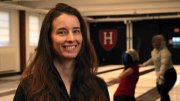Daria Schneider spent childhood afternoons in Brookline, Massachusetts’s, Lawrence Park, playing basketball, soccer, and baseball until parents broke up the competition for dinner. Sparring with older, athletic boys fueled her competitiveness—for which she soon found an outlet in fencing, an evening activity at her elementary school. Her coach cared about winning—a change from Brookline schools’ emphasis on what she calls “participation over competition.” She fenced at Columbia, where she served twice as captain, studied Russian literature, and held jobs ranging from social work researcher to laundry gatherer. After graduating in 2010, she spent four years as her alma mater’s assistant fencing coach while also training for competition. As a five-time U.S. national team member, two-time world championship medalist, 2007 individual NCAA champion, and 2011 national champion, she calls herself “one of the best fencers to never qualify for the Olympic Games”—a shortcoming that helps her connect with students “who are working their butts off and not quite achieving their goals.” In 2016, she became Cornell’s coach. But the Big Red has no men’s team, and thus a slim shot at a national title. In 2019, Schneider came to Cambridge following former coach Peter Brand’s dismissal for an admissions scandal. After hiring new assistant coaches, revamping training, and introducing mindfulness exercises, she led Harvard last year to its first national fencing title since 2006. Off the training mat, she serves on the U.S. Olympic & Paralympic Committee board of directors and hopes to help more women coach in future Olympics (only one of the 22 fencing coaches at the Paris games was female). After practice, Schneider heads home, where she is trying to recreate her childhood for her two sons, aged seven and three; in the afternoons, she and her partner (also a coach: high school wrestling) watch out their window as the boys play. Her kids are quickly growing competitive—where will that lead them?
Harvard Women's Fencing Head Coach Daria Schneider
Harvard Women's Fencing Head Coach Daria Schneider
A coach restores the luster to Harvard fencing.

Daria Schneider | Photograph by Stu Rosner
You might also like
Harvard Students, Alumni to Compete at the 2026 Olympics
Six Crimson athletes are headed to the XXV Winter Games in Milano Cortina.
Introductions: Dan Cnossen
A conversation with the former Navy SEAL and gold-medal-winning Paralympic skier
England’s First Sports Megastar
A collection of illustrations capture a boxer’s triumphant moment.
Most popular
Explore More From Current Issue

Inside Harvard’s Most Egalitarian School
The Extension School is open to everyone. Expect to work—hard.

How a Harvard and Lesley Group Broke Choir Singing Wide Open
Cambridge Common Voices draws on principles of universal design.

How a Harvard Hockey Legend Became a Needlepoint Artist
Joe Bertagna’s retirement project recreates figures from Boston sports history.





